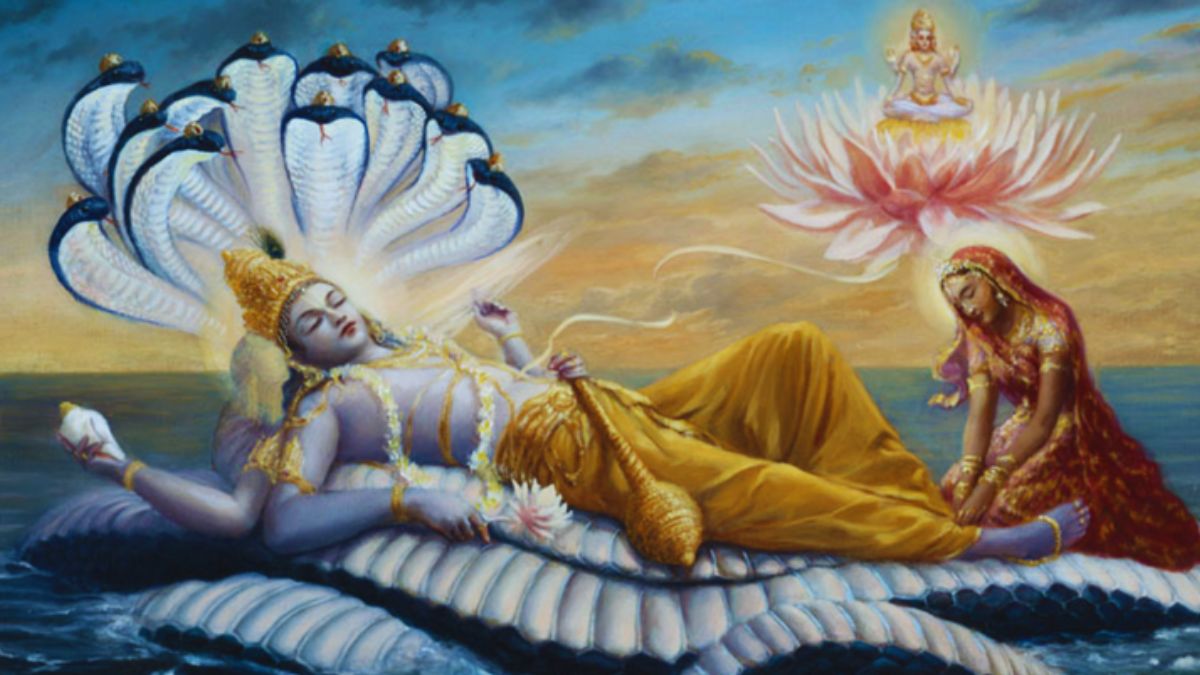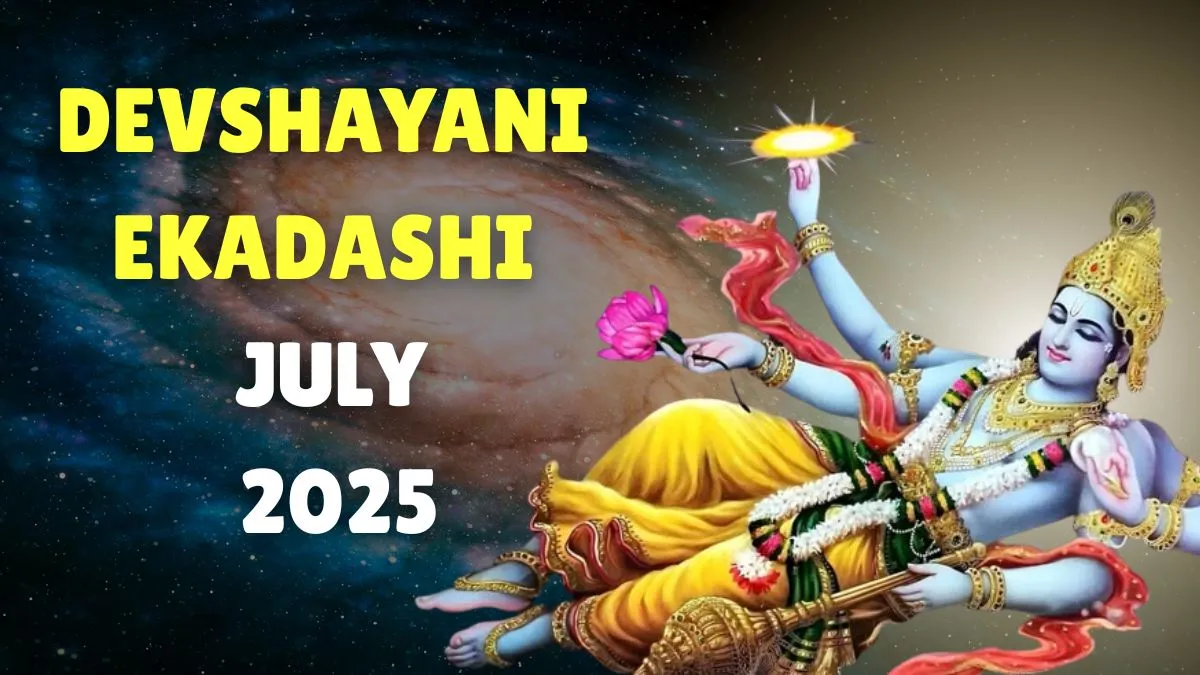- By Kashish Rai
- Thu, 03 Jul 2025 12:04 PM (IST)
- Source:JND
Devshayani Ekadashi 2025: Shayani Ekadashi is a profoundly sacred day for Hindus, especially Vaishnavas, who reverence Lord Vishnu as the supreme deity. This auspicious Ekadashi falls on the eleventh day of the waxing moon phase in the Ashadha month. Also known as Ashadi Ekadashi, it's regarded as one of the holiest of all Ekadashi days. Devotees consider this day particularly significant, and it's also referred to as Maha Ekadashi, Padma Ekadashi, and Sarvapaaphaari Ekadashi. Among the Telugu-speaking population, it's affectionately known as Tholi Ekadashi. This sacred day is a time for spiritual reflection, devotion and seeking blessings from Lord Vishnu. This year, Devshayani Ekadashi falls on 6th July 2025, Sunday.
Check out all the significant details regarding the date, parana time, significance, rituals and vrat katha associated with this sacred Ekadashi vrat below:
Devshayani Ekadashi 2025: Date And Time
- Devshayani Ekadashi 2025 Date: 6th July 2025, Sunday
- Ekadashi Tithi Begins: 06:59 PM, 5th July 2025
- Ekadashi Tithi Ends: 09:15 PM, 6th July 2025
Devshayani Ekadashi 2025: Parana Time
The Parana Timings for Devshayani Ekadashi are from 05:29 AM to 10:07 AM on 7th July 2025.
Devshayani Ekadashi 2025: Significance
Shayani Ekadashi marks the beginning of Chaturmas, a sacred four-month period in the Hindu calendar. According to the Padma Purana, Brahmavaivarta Purana and Bhagwat Mahapuran, this Ekadashi holds great significance. The Padma Purana states that fasting on this day destroys sins and brings salvation, while the Brahmavaivarta Purana believes that observing a fast fulfils all wishes. During Chaturmas, 16 sacraments are restricted, but worship, rituals, and certain auspicious activities are permitted. Devotees worship Lord Hari, Goddess Lakshmi and Tulsi Devi, seeking their blessings.
According to the Bhagwat Mahapuran, Lord Vishnu falls asleep or enters deep meditation on this day and wakes up four months later on Prabodhini Ekadashi. This period is filled with significant Hindu festivals like Janmashtami, Ganesh Chaturthi, Navratri and Diwali. Many devotees observe fasts and seek Lord Vishnu's blessings, setting the tone for a spiritually enriching Chaturmas.

On Devshayani Ekadashi, Lord Vishnu enters Yog Nidra, a sacred slumber, symbolising his divine rest. Devotees worship him with devotion, seeking blessings and spiritual growth during this auspicious four-month period. (Image Source: ISKCON Bangalore)
Devshayani Ekadashi 2025: Rituals
To prepare for Devshayani Ekadashi, devotees begin by observing certain rituals on the preceding Dashami Tithi. They avoid tamasic food, salt, barley, meat, wheat and masoor dal, and sleep on the ground to purify their minds and bodies. It's essential to speak truthfully and avoid hurtful speech on both Dashami and Ekadashi Tithis. The fast commences on Dashami Tithi and continues until the morning of Dwadashi Tithi.
On Ekadashi Tithi, devotees wake up early, take a bath, and worship Lord Vishnu with devotion. They perform Vishnu Puja, tie a Kumbh with a red cloth and place the idol or picture of God on top of it. The Kumbh is then worshipped, followed by offering incense, lamps and flowers to Lord Vishnu. By following these rituals and fasting rules, devotees seek to purify their souls and attain spiritual growth. With devotion and dedication, they observe the fast and worship Lord Vishnu, seeking his blessings and guidance.
Devshayani Ekadashi 2025: Vrat Katha
The legend of Devshayani Ekadashi is a timeless tale of devotion and redemption. King Mandhata, a just and beloved ruler, faced a severe crisis when his kingdom was plagued by a three-year drought, leaving his people struggling with hunger and illness. Determined to find a solution, King Mandhata embarked on a journey, seeking wisdom from holy men. It was Sage Angira who finally offered him guidance, advising the king to worship Lord Vishnu on Devshayani Ekadashi and observe a fast with utmost devotion.
King Mandhata returned to his kingdom and diligently observed the Devshayani Ekadashi fast, along with his people. As they worshipped Lord Vishnu with sincerity, the kingdom's fortunes began to change. The rains returned, and with them, prosperity and happiness. The kingdom flourished once more, and King Mandhata's people rejoiced. According to legend, those who observe Devshayani Ekadashi with devotion are blessed with peace, happiness and prosperity. By worshipping Lord Vishnu on this sacred day, devotees can attain liberation from the cycle of birth and death, ultimately achieving salvation or Moksha.
(Disclaimer: This content includes advice providing generic information only. It is in no way a substitute for qualified spiritual or astrological opinion. Always consult a specialist for more information before adopting any measures.)

